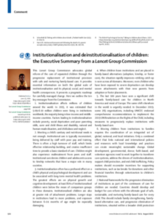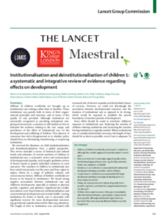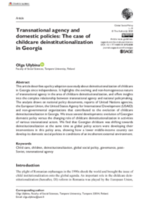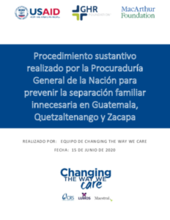Displaying 211 - 220 of 946
In this commentary piece, Aisha K Yousafzai - of the Department of Global Health and Population at the Harvard TH Chan School of Public Health and the and Department of Paediatrics and Child Health at Aga Khan University - notes that "the evidence presented [in the Lancet Group Commission on the institutionalisation and deinstitutionalisation of children] and their call to action to ensure abandoned children can thrive in family-based care environments rather than in institutions matters now more than ever as the global community addresses unprecedented challenges to ensure a generation of children are not left behind with respect to their survival, health, development, learning, and safety."
This Executive Summary provides an overview of the Lancet Group Commission, which advocates global reform of the care of separated children through the progressive replacement of institutional provision with safe and nurturing family-based care.
This paper reviews the literature on child institutionalisation and deinstitutionalisation from a global perspective. This review included a survey of historical and cultural trends and estimates of current numbers of children in institutional care, a systematic review and meta-analysis of developmental sequelae, and a largely qualitative review of factors found to predict individual variations in such outcomes.
In this commentary piece for The Lancet Psychiatry, Joan Kaufman highlights some key findings and recommendations from the Lancet Group Commission on the institutionalisation and deinstitutionalisation of children.
In this webinar, a panel including persons with disabilities and experts in disaster management, human rights and service provision discuss the need for “emergency deinstitutionalisation” of persons with disabilities and how this could be achieved.
This article describes a policy adoption case study about deinstitutionalization of childcare in Georgia since independence. It highlights the evolving and non-homogeneous nature of transnational agency in the area of childcare deinstitutionalization, and offers insights into the complex relationship between transnational agency and national policymaking.
El objetivo principal del informe es sistematizar el procedimiento sustantivo en los Departamentos de Guatemala, Quetzaltenango y de Zacapa realizado por Procuraduría General de la Nación (PGN) en el que se individualiza el tipo de amenaza o vulneración en el caso concreto e identifica si la misma puede ser resuelta mediante una intervención gubernamental específica, sin necesidad de intervención jurisdiccional y su análisis. El documento contiene un estudio del Sistema de Gestión para la Atención Integral de la Niñez y la Adolescencia, en relación al funcionamiento por parte de la Procuraduría General de la Nación de Quetzaltenango, Guatemala y Zacapa, y un análisis de casos resueltos judicialmente en Zacapa que podrían haberse tramitado previamente en la vía administrativa y evitar la institucionalización (gatekeeping mechanism en ingles)
This article compares how the global policy of deinstitutionalisation (DI) of child welfare travelled, was translated and institutionalised in two post-Soviet countries – Russia and Kazakhstan.
In this chapter of Foster Care and Best Interests of the Child, the authors describe the history of legislative and judicial efforts to reform the foster care system.
This chapter of Foster Care and Best Interests of the Child provides a template for evaluating and reforming the U.S. foster care system to prioritize the best interests of children.




